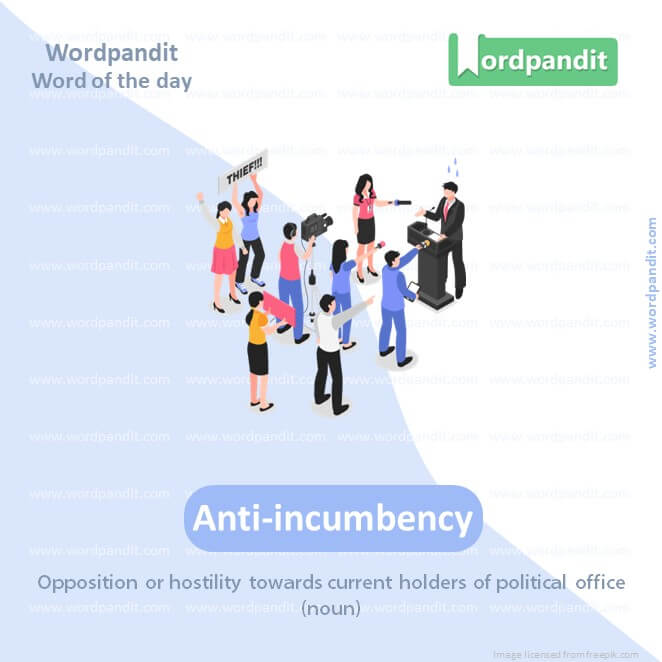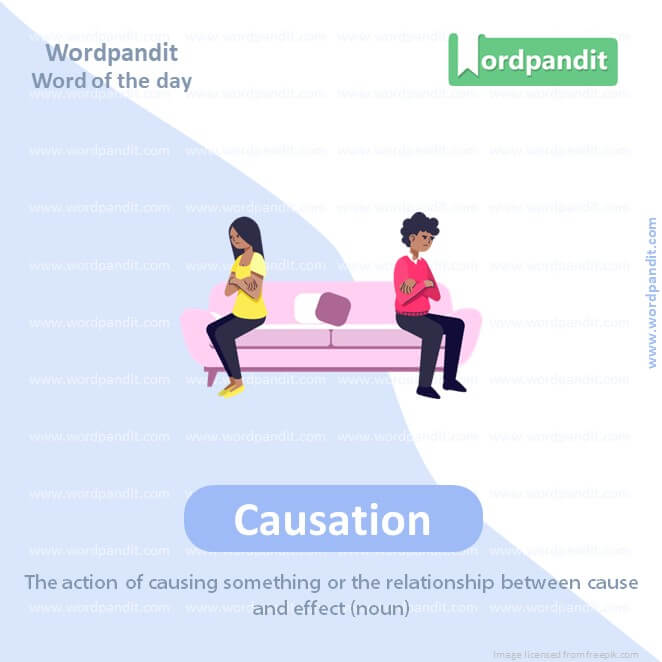Daily Vocabulary Words: List of Daily Used Words
Hi there. Welcome to this special section @ Wordpandit.
Our endeavour here is straightforward: highlighting important daily vocabulary words, you would encounter in The Hindu. This is your repository of commonly used words; essentially, we are posting a list of daily used words. Hence, this has significant practical application as it teaches you words that are commonly used in a leading publication such as The Hindu.
Visit the website daily to learn words from The Hindu.

WORD-1: Algorithm
CONTEXT: Israeli writer Yuval Noah Harari had said that the algorithm is the most important word of the 21st century. But another word that is giving it a run for its money during the electoral season is ‘anti-incumbency’.
SOURCE: The Hindu
EXPLANATORY PARAGRAPH: An algorithm is like a set of steps to solve a problem or do something, kind of like a recipe you follow to bake a cake.
MEANING: A process or set of rules to follow in calculations or other problem-solving operations, especially by a computer (noun).
PRONUNCIATION: al-go-rith-um
SYNONYMS: Procedure, Process, Formula, Method, System
USAGE EXAMPLES:
1. The computer program uses a complex algorithm.
2. She learned an algorithm to solve the puzzle quickly.
3. Algorithms are essential in computer programming.
4. The website’s search algorithm was updated.

WORD-2: Anti-incumbency
CONTEXT: Israeli writer Yuval Noah Harari had said that the algorithm is the most important word of the 21st century. But another word that is giving it a run for its money during the electoral season is ‘anti-incumbency’.
SOURCE: The Hindu
EXPLANATORY PARAGRAPH: Anti-incumbency is like when people don’t want the same leaders who are already in charge, wanting to try someone new instead.
MEANING: Opposition or hostility towards current holders of political office (noun).
PRONUNCIATION: an-tee-in-kum-ben-see
SYNONYMS: Opposition, Resistance, Disfavor, Hostility, Discontent
USAGE EXAMPLES:
1. The election showed strong anti-incumbency sentiment.
2. Anti-incumbency factors influenced voter choices.
3. The party faced anti-incumbency in the region.
4. Anti-incumbency waves often change political landscapes.

WORD-3: Psephologists
CONTEXT: Psephologists are now fond of explaining (without understanding?) a lot of things that happen as a part of anti-incumbency. They almost speak of it the way cricket commentators speak of averages. Even in cricket, it often makes no sense to say that a team won at a venue for ‘n’ number of times, which often has no correlation or causation with the result in the next game. In cricket, this could add to the entertainment quotient, but to reduce elections to a law of averages is to completely miss the thrust that needs to be there in foregrounding the key issues that matter to people, and why they turn out to vote in such large numbers.
SOURCE: The Hindu
EXPLANATORY PARAGRAPH: Psephologists are like special detectives who study elections and try to figure out why people vote the way they do.
MEANING: Experts who study and analyze elections and voting patterns (noun).
PRONUNCIATION: see-fo-lo-gists
SYNONYMS: Election analysts, Voting experts, Electoral scholars, Political scientists, Election specialists
USAGE EXAMPLES:
1. Psephologists predicted the election outcome.
2. The psephologists conducted a voter behavior study.
3. Psephologists often appear on TV during elections.
4. Their analysis is important for psephologists.

WORD-4: Causation
CONTEXT: Psephologists are now fond of explaining (without understanding?) a lot of things that happen as a part of anti-incumbency. They almost speak of it the way cricket commentators speak of averages. Even in cricket, it often makes no sense to say that a team won at a venue for ‘n’ number of times, which often has no correlation or causation with the result in the next game. In cricket, this could add to the entertainment quotient, but to reduce elections to a law of averages is to completely miss the thrust that needs to be there in foregrounding the key issues that matter to people, and why they turn out to vote in such large numbers.
SOURCE: The Hindu
EXPLANATORY PARAGRAPH: Causation is like understanding why something happened, like figuring out why a glass broke when it fell off the table.
MEANING: The action of causing something or the relationship between cause and effect (noun).
PRONUNCIATION: caw-za-tion
SYNONYMS: Cause and effect, Origination, Inducement, Generation, Production
USAGE EXAMPLES:
1. The study explored the causation of the disease.
2. They debated the causation behind the economic crisis.
3. Understanding causation is crucial in science.
4. The lawyer argued about causation in the case.

WORD-5: Foregrounding
CONTEXT: Psephologists are now fond of explaining (without understanding?) a lot of things that happen as a part of anti-incumbency. They almost speak of it the way cricket commentators speak of averages. Even in cricket, it often makes no sense to say that a team won at a venue for ‘n’ number of times, which often has no correlation or causation with the result in the next game. In cricket, this could add to the entertainment quotient, but to reduce elections to a law of averages is to completely miss the thrust that needs to be there in foregrounding the key issues that matter to people, and why they turn out to vote in such large numbers.
SOURCE: The Hindu
EXPLANATORY PARAGRAPH: Foregrounding is like making something the most important part of a picture, like when you draw a big tree in front and everything else is small behind it.
MEANING: Making something the most prominent or important feature (verb).
PRONUNCIATION: for-ground-ing
SYNONYMS: Highlighting, Emphasizing, Accentuating, Stressing, Underlining
USAGE EXAMPLES:
1. The article was foregrounding the need for environmental action.
2. Foregrounding certain issues can influence public opinion.
3. The teacher was foregrounding the key points in the lesson.
4. The novel foregrounds the experiences of its main character.
WORD-6: Anodyne
CONTEXT: What such anodyne language of anti-incumbency does is to shift the attention from the issues that matter and reduces it to averages and the business of prediction (like Nostradamus). Even more dismaying is that such language tends to normalise discontent.
SOURCE: The Hindu
EXPLANATORY PARAGRAPH: Anodyne is like something that helps to make you feel better or less worried, like a kind word or a bandage on a small cut.
MEANING: Not likely to provoke dissent or offense; inoffensive, often deliberately so (adjective).
PRONUNCIATION: an-o-dyne
SYNONYMS: Soothing, Calming, Pain-relieving, Comforting, Mild
USAGE EXAMPLES:
1. The speech was filled with anodyne statements.
2. She offered an anodyne remark to ease the tension.
3. The music had an anodyne effect on the baby.
4. Anodyne therapy is used for pain relief.
WORD-7: Dismaying
CONTEXT: What such anodyne language of anti-incumbency does is to shift the attention from the issues that matter and reduces it to averages and the business of prediction (like Nostradamus). Even more dismaying is that such language tends to normalise discontent.
SOURCE: The Hindu
EXPLANATORY PARAGRAPH: Dismaying is when something makes you feel sad or worried, like when your favorite toy breaks.
MEANING: Causing concern and distress (adjective).
PRONUNCIATION: dis-may-ing
SYNONYMS: Alarming, Disturbing, Upsetting, Disconcerting, Troubling
USAGE EXAMPLES:
1. The news was dismaying to everyone.
2. She found the lack of progress dismaying.
3. The dismaying statistics prompted immediate action.
4. It was dismaying to see the park in such bad condition.
WORD-8: Perennially
CONTEXT: Even more dismaying is that such language tends to normalise discontent. For example, the Congress lost in the Rajasthan Assembly election because that has been the trend for the last 30 years, which displaces the question why are people perennially unhappy with their governments and what are the issues that have been going unheard for 30 years.
SOURCE: The Hindu
EXPLANATORY PARAGRAPH: Perennially is like something happening again and again, every year, like celebrating your birthday.
MEANING: In a way that continues for a long or seemingly infinite time; persistently (adverb).
PRONUNCIATION: pe-ren-ni-al-ly
SYNONYMS: Continuously, Perpetually, Constantly, Endlessly, Yearly
USAGE EXAMPLES:
1. The garden is perennially beautiful.
2. He is perennially optimistic about the future.
3. The issue is perennially debated in politics.
4. This problem is perennially challenging for experts.
WORD-9: Autocracy
CONTEXT: But the question is not about pro-incumbency in Madhya Pradesh but, instead, how a government does win a large number of seats with a not-so-good-looking governance track record. Why did issues of mis-governance not matter? Or, how were they made not to matter? This displacement of focus on social development contributes handsomely to ‘electoral autocracy’.
SOURCE: The Hindu
EXPLANATORY PARAGRAPH: Autocracy is like when one person makes all the rules and decisions without asking anyone else, like a king or queen in a story.
MEANING: A system of government by one person with absolute power (noun).
PRONUNCIATION: aw-toc-ra-cy
SYNONYMS: Dictatorship, Despotism, Totalitarianism, Tyranny, Absolutism
USAGE EXAMPLES:
1. The country was ruled by autocracy.
2. He criticized the autocracy for its lack of democracy.
3. Historically, autocracy was common in many regions.
4. The novel depicted life under an autocracy.
WORD-10: Technocratic
CONTEXT: The language of anti-incumbency is a technocratic one that works as a neo-liberal assemblage. It flattens out complex processes to feed the electronic media and digital images.
SOURCE: The Hindu
EXPLANATORY PARAGRAPH: Technocratic is like when smart people who know a lot about science and technology are in charge of making decisions.
MEANING: Relating to or characterized by the government or control of society or industry by technical experts (adjective).
PRONUNCIATION: tek-no-crat-ic
SYNONYMS: Technical, Expert-driven, Specialized, Knowledge-based, Professional
USAGE EXAMPLES:
1. The new policy was influenced by technocratic thinking.
2. He proposed a technocratic approach to solving the problem.
3. The government had a technocratic leadership style.
4. The plan required a technocratic assessment.
vocabulary journey
In the realm of language learning, one unparalleled method has been consistently proven to provide tremendous value – engaging with vocabulary journal words. This practice is a brilliant tool that provides a platform for the gradual introduction of new words, phrases, and their nuances.
But how exactly should we approach learning vocabulary journal words?
Originally, vocabulary journal words are a collection of new words you encounter that are challenging and unfamiliar. On stumbling upon such words, take the first step by writing them down in your journal. But simply recording them isn’t enough. The real strength of vocabulary journal words lies in understanding and using them in context. Draft sentences using these words, as this practical usage not only enhances retention but also familiarizes you with their applicability.
Expanding your vision beyond memorization, indulge in understanding the background of these vocabulary journal words. Dive into the etymology of the words, learn their origins, and uncover the different meanings they’ve held over time. This nugget of information often aids in deeper understanding and long-term retention of words.
Your engagement with vocabulary journal words should not be reserved for solitary learning. Discuss these words in conversation with friends, family, or language mentors. This encourages active usage and, silently but surely, integrates them into your everyday language.
Another enchanting side to vocabulary journal words is the potential for creativity. Create small stories or visuals connected to the words, leading your brain to create multiple neural connections to the meaning of the word – a powerful strategy for enhancing retention.
In essence, vocabulary journal words offer a multifaceted, immersive learning process that goes beyond just enhancing your word-list. They open doors to the dynamic world of language and its contexts, training your mind to appreciate, understand, and effectively communicate with an enriched vocabulary. Consider vocabulary journal words not as a task but as your secret allies on your beautiful journey through language learning.













